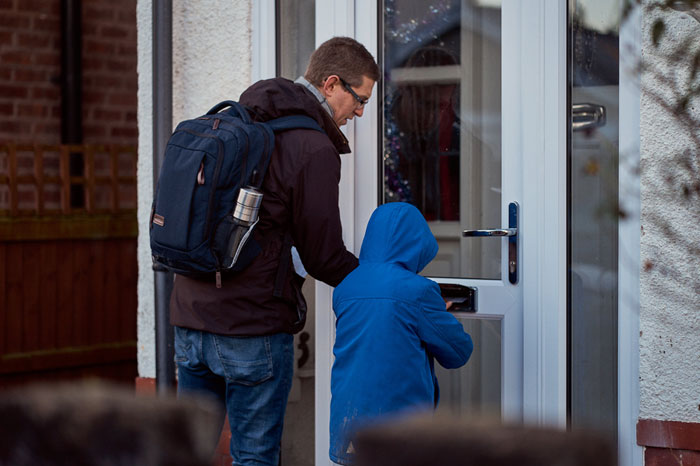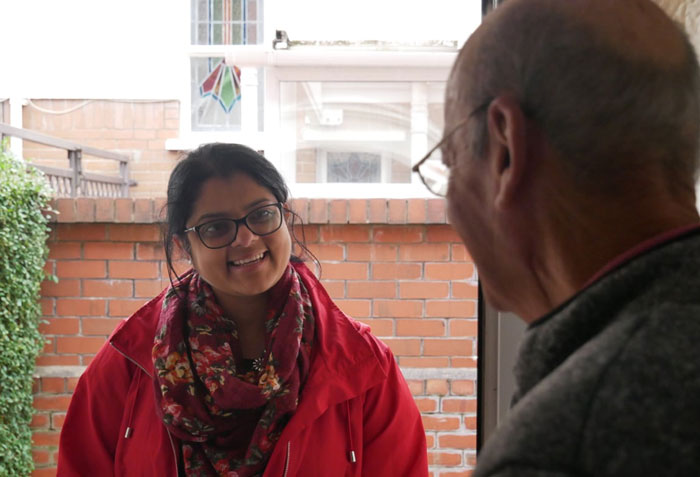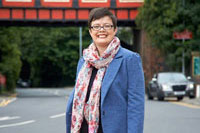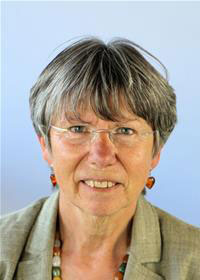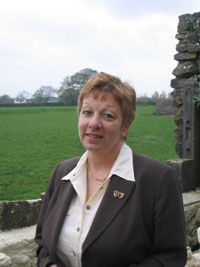Be a councillor
Foreword
I am delighted to be writing this foreword for this Welsh edition of the Be a Councillor booklet, produced by the Local Government Association (LGA) and ALDC (Association of Liberal Democrat Councillors), which has been designed to give you the encouragement and information you need in order to take the next step in standing for council.
This booklet contains stories from several Welsh Liberal Democrat councillors which I hope will inspire you in your journey towards representing your community in your own town hall.
If we want to help people get on, and build a fairer, greener, more caring future, we have to win.
And that is why, next May, we must get more Liberal Democrats elected to councils across Wales.
Make 2022 the year you can say “I stood up for what I believe in”. Be a councillor.
Ed Davey MP
In 2017 the Liberal Democrats stood in just 22 per cent of seats - our voice has been missing too often in local decision making and we need to make sure as a party we are doing more to encourage people to stand for what they believe in.
We really need, as a party, to improve both our paper, and target candidates’, diversity as well as that of our campaign teams.
For some people standing as a paper candidate is the first step to standing as a target candidate and therefore just as we need to act on target candidate diversity the same needs to be true for all candidates standing as Liberal Democrats.
Campaign teams need to carry out an assessment of their current cohort of candidates and councillors and look for opportunities for those who we are missing.
Here in Wales we are: providing mentoring from experienced local councillors; advice to local parties on auditing their current campaigns and seeing who they are missing; and reviewing our grants ensure more diverse candidates.
Claire Halliwell
Chief Executive of the Welsh Liberal Democrats
Could I be a Welsh Liberal Democrat councillor?
YES!
Welcome to the ‘Be a Councillor’ guide.
Welsh Lib Dem councillors have long been an important democratic voice for the party. Our well-worn mottos of ‘working hard all year round’ and ‘success you can see’ really mean something to the communities we represent. This guide contains information about how councils work, the role of a councillor and most importantly, what being a Lib Dem councillor looks like.
Inside the guide, you will hear from four female several of our Lib Dem councillors from different local councils. They have shared why they are Lib Dem councillors and why it is important to them to represent their communities. The guide is a great starting point if you have ever looked at other councillors and thought ‘I could do this’. There is also information about where to go to find out more.
In local government the Lib Dems are working hard for local people, standing up for our communities and making sure everyone knows the difference the Lib Dems can make. As Lib Dem councillors we are proud to serve our communities and set high standards for ourselves. We are part of shaping the future of our communities, villages, towns and cities. We also are hugely important in supporting and upholding the principles of liberal democracy in action. Local government is undergoing huge changes and challenges. It is more important than ever that Lib Dems are there to remind everyone that local government is there for local people. Representing local people and campaigning with them is what we do best.
You may already be a campaigner, community activist, involved in your local church or mosque, or a local school governor. You might help to deliver leaflets or organising events. If so, you already have a great basis for taking up public office and becoming a Lib Dem councillor. But ultimately, if you really care about your area, and want work to make it the best place it can be, becoming a Lib Dem councillor could be for you.
We hope you find this guide useful, and if you decide to stand for election, we look forward to welcoming you into the Lib Dem local government family. In 2017 the Welsh Liberal Democrats stood in just 22 per cent of seats - our voice has been missing too often in local decision making and we need to make sure as a party we are doing more to encourage people to stand for what they believe in. When just one in three councillors and 17 per cent of council leaders are women more does need to be done to improve diversity at our town halls.
What is a councillor and what do they do?
Councillors are elected by communities to represent them and to run their local authority. Councillors represent wards or divisions which vary greatly in size across the country. There are 22 local authorities in Wales with some 1254 councillors.
Councillors are expected to be active in the life of their local community and act as the voice of their constituents, raising any concerns with the local council on a range of matters related to the work of the council. From waste collection to street-lights, housing to social services, councillors talk to people about everything and anything.
Welsh Liberal Democrat councillors represent the Party and its policies, and are an important part of their local party, feeding back to members about what is happening at the council.
Councillors may also work with politicians at a regional, national and European level on issues of local importance which have national implications.
Councillors are elected for a five- year term in Wales unless they are elected at a by-election, in which case they must stand again at the next normal election for the seat. They are often referred to as ‘members’ of the council.
The council is controlled by either the political party which has a majority of councillors or, if no one party has a majority, there may be a coalition of parties or a minority administration.
The councillor’s role will vary depending on whether the Lib Dem is in control or in opposition, but generally speaking will include some or all of the following broad responsibilities:
- dealing with individual pieces of casework for local residents and helping them resolve issues
- leading on local campaigns on behalf of the local communities
- serving on council committees which look at decisions being made or have specific legal or ‘regulatory’ duties
- if Lib Dems run the council, potentially making decisions which decide how local services are delivered
- acting as community leaders and helping local people get involved in the decisions made by the council.
Being a councillor is easily the best thing I have ever done, and is something that I am really proud of. Being able to help people and make local democracy relevant to everyday life is hugely satisfying.
"I am especially keen to use my experiences to encourage others to get involved, particular underrepresented groups such as women, people of colour, and those with disabilities (whether they be visible or not) but I firmly believe in doing so by being upfront and honest about the challenges that come with it, as well as the joys it can bring.
"In the times of social media, being a councillor can become all consuming, so going into it you have to have an idea of what your personal boundaries are – how much time are you willing to commit, where do you draw the line in terms of needing to focus on other aspects of life e.g. work, family, friends, hobbies etc. It’s not a role that easily fits in with an already busy life, and so as with everything you have to figure out what the best balance is for you. Never forgetting that you can’t help others effectively if you don’t look after yourself as well."
"The demands are high but so are the rewards, and we need more diverse candidates to help local democracy become more accessible for future generations."
Councillor Emma Sandrey, Cardiff
What is involved in being a councillor?
Being a Liberal Democrat councillor is a rewarding experience and many councillors will tell you that they have obtained new skills and experiences whilst working with their communities.
Together with Lib Dem MPs, Senedd Member, and community councillors, Lib Dem councillors are also important in making sure there is a good reputation for the Welsh Lib Dems in the area.
Here are some things to think about before deciding to stand for election.
What’s the time commitment?
Think about how you would balance the responsibilities of being a councillor alongside family, friends and employment.
Talk to the people around you before you stand, their support will be really important. If you have Lib Dem councillors or former councillors in your area, have a chat with them about what is involved.
If you also work, talk to your employer. You are entitled to time off for being a councillor and many employers see the benefit of an employee gaining such great experience outside the workplace.
If you have caring responsibilities, think about how to manage those. Many people looking after children or dependent adults make excellent local councillors as they have direct personal knowledge of the services that affect people just like them.
Can I afford to do it?
Most councillors receive an ‘allowance’ for their duties which is taxable. Being a councillor is a job and the allowance is to ensure that if elected you are not left out of pocket. If you are on benefits these allowances can affect your entitlement, so get advice before agreeing to stand.
There is also a childcare and dependents’ carers’ allowance for attendance at meetings payable on production of receipts, up to an agreed maximum cost per hour.
The council also provides a special responsibility allowance to those who undertake additional duties such as the Leader of the Council, portfolio holders, scrutiny chairs and opposition leaders.
Most Lib Dem Groups also agree to give part of their allowances to their local party to help get more Lib Dems elected.
What training do I need?
You don’t have to be highly educated or have a profession. Skills gained through work, education, bringing up a family, caring for a sick or disabled relative, volunteering or being active in faith or community groups are really valuable.
In addition, the Liberal Democrats and its councillors’ association (ALDC) offers training for people thinking of standing for election, as well as for candidates, and all councils provide training for both new and experienced councillors.
How do I become a Liberal Democrat councillor?
Before you can be a councillor you must get elected. The Welsh Liberal Democrats aim to stand candidates in every ward, and are always looking for good new people to get involved. There is a procedure to go through, but it is not complicated and there are lots of points at which you are offered help and support.
Getting approved as a candidate
There are two main reasons to have a candidate approval system. The first is to ensure that potential candidates know what is expected of them, but it is also to ensure that anyone who has the Lib Dem name and logo associated with them does the party credit.
The form the approval process takes can be adapted to suit your local area, and so whether you are in control of the council or if you are struggling to get a full slate of candidates, there is a process that can work for you.
Most approval processes involve completing a simple application form and an interview. The questions for both of these need to be agreed by the approval panel, although templates and crib sheets are available.
If you’re in a smaller local party or have a large number of wards where you will struggle to find candidates, you may decide not to include the interview part of the process, although getting potential candidates to complete a form is always useful as it gives you written ‘evidence’ in case there are problems at a later stage.
The interview should be professional but not be too formal. It shouldn’t be a harsh grilling and all efforts should be made to put the potential candidate at ease. Before the panel meets it is a worthwhile exercise to discuss and write down the qualities that make a good a Lib Dem councillor. These are not always skills that you can learn or develop through training but their absence can later cause problems for the reputation of the party or group unity.
Councillors often have to make difficult choices in public about the services their councils are responsible for. This is a considerable responsibility. Top of most lists would come: Lib Dem values, team player, and loyalty to the group and the party. As a party we also need to improve the diversity of those people we encourage to stand, and we actively encourage Welsh speakers to consider standing too.
Getting selected as a candidate
As a democratic party it is important that we have a fair, open and transparent process for choosing the people who stand for us in elections. The procedure is not designed to be complicated or onerous, but is intended to ensure we get the best candidates and that everyone who put themselves forward is given an equal opportunity of being selected.
Even if you are in an area where council candidates often get selected unopposed or where your existing councillors are hoping to re-stand, you still need a fair selection process to make sure that others have the opportunity of standing and to put you in good stead for when selections become more competitive.
There is a lot of freedom in how candidate selections can be organised, however, there are a few principles that are important:
- where there is an election for a candidate, this must be done through a secret ballot using the Single Transferable Vote system
- no one should be automatically re- selected, including sitting councillors
- all candidates must have been approved as a candidate within four years before they can put their name forward for selection.
The initial stage is for local parties to advertise the wards in which they are selecting candidates to all of the party membership within the council area.
Potential candidates will be asked to submit a simple application form or slip or send an expression of interest through an email to the Returning Officer.
As a campaigning party we should encourage potential candidates to speak to members if they want to be selected. All applicants should be given a list of the members eligible to vote, (which should be returned after the selection), with encouragement to get in touch with them. The Returning Officer may also wish to allow each candidate to produce their own canvass leaflet.
The Returning Officer should also write to all of the eligible voters explaining that a selection is underway, that they may be contacted by candidates and including a one-side of A4 artwork from each candidate.
They should also outline details of a hustings meeting when members can come along and listen to speeches from candidates and ask questions.
Most selections allow members to have a postal ballot if they cannot attend the hustings meeting, but usually these are only available on request to the Returning Officer. In most cases, the votes are counted at the end of the hustings meeting, but in some places they run a full postal ballot. This is for you to decide.
"I was elected a county councillor for the first time in 2017 having been a community councillor in Llangattock for some years. As I am deaf, I have the support of my Hearing Dog for Deaf People, Lucie, who attends meetings and supports me with sound work when needed.
"There is so much you can do as a County Councillor, but you have to get elected first! I was able to maintain close links with residents of the ward which I intended to stand in prior to the election but could only do this once selected by the Brecon & Radnorshire Constituency Executive. A process of support and mentoring enabled more candidates to come forward for the 2017 local elections and this proved incredibly successful, getting more county councillors elected in Powys than had been the case for many years. The same process will be established in 2020 to get a full suite of candidates for 2021 so the Welsh Lib Dems can actually take over the council.
"Becoming a councillor is a big responsibility and it takes some courage to get up there to be counted but it brings such rewards. As a county councillor I have been able to continue my work supporting the local Health Board of which I was a Nominated Welsh Government Member for some years and increased my commitment to environmental issues in the council.
"My disability does not hold me back, but it has been a difficult journey to ensure I am able to undertake all the roles expected of a county councillor and engage in my ward.
It has been an amazing journey for me personally and demonstrated that you can overcome any disability to become an elected representative with the right help and support. You have to demonstrate to all around you that the ability to represent people isn’t about how clever you are, or who you know or what qualifications you have, it’s about commitment, understanding people and working hard."
Councillor Jackie Charlton, Powys
Getting elected as a councillor
Unless you are a candidate in a by- election, the election will most likely happen on the first Thursday in May. Between your selection and election day you will be expected to help lead Lib Dem campaigning in your ward, and, in particular, to talk to voters and listen to their concerns.
This can be done on the doorstep and/or by phone, and there are various kinds of events you can hold as well as leaflets and letters you can distribute.
You will have an agent (and/or campaign manager), and that person will be responsible for organising the detail of the campaign. As polling day approaches things will get busier, and more will be expected of you, so remember to be proactive in making sure that you still have time for family and work.
If you are elected you will be expected to start immediately, so make sure in advance that people such as your family and employers know this.
Although you don’t need any particular training to stand for election, think about what skills and attributes you do have and how they might help.
For instance, councillors are expected to be available to enable constituents to come to them with problems. This means that councillors need to have good listening skills, the ability to represent someone, to keep confidences, and to resolve conflict.
How can I find out more?
There is more information below in the section called ‘Once you’re elected’, as well as online at the ALDC website. The LGA has also produced a workbook to help you to go through some of the things you need to consider.
Costs, legal issues and probity
The main cost of getting elected is the cost of the campaign itself. Items such as leaflets, canvass cards and posters. Local parties should have a fundraising plan to cover the cost of the campaign.
Candidates do not receive expenses or payments, but once elected councillors normally do receive allowances.
There are some legal constraints on who can and can’t be a local councillor, for example you have to live or work in the council area where you want to stand. There are other reasons such as bankruptcy which prevent an individual from standing and most local authorities publish the reasons why a person couldn’t stand in the election section on their websites.
Elected representatives at every level are required to complete a Register of Interests which declares your financial and property interests and membership of any organisation that may influence you – such as a political party. The main thing to remember is, if in doubt, declare it and take advice from the Chief Legal Officer if you are elected.
Every council also has a ‘Members’ Code of Conduct’ which sets out rules for how its councillors are expected to conduct themselves in office such as the need to declare any pecuniary interests at a meeting before items are discussed. Following election, all newly elected councillors sign a written undertaking to abide by the Code of Conduct. Council officers provide advice on all of these matters to councillors.
Liberal Democrat Groups also have Standing Orders to ensure that group business is conducted fairly and professionally. Make sure you are given a copy of the Standing Orders during your approval and selection process. If you are elected they will be your Standing Orders too.
Being a Liberal Democrat councillor
If you are elected you will take up office immediately, and although it may seem a little intimidating at first there will be training and support to help you settle in. The council will run an induction for new councillors, and, in terms of the work in the ward, you will find that much of it will follow on from the work you were doing before the election as a local campaigner.
Liberal Democrat campaigners believe that councillors and indeed the whole structure of local government should engage with people and work with them rather than simply take decisions on their behalf.
Welsh Lib Dem councillors are expected to keep their residents up-to-date with what they have been up to. With regular newsletters in many places called FOCUS, emails and Facebook and social media posts.
They may also hold advice surgeries for constituents, attend regular Liberal Democrat Group meetings and play a full part in the life of the Party locally in their area. Lib Dem campaigners and councillors will often be the people leading the charge on issues of great importance to a local community.
A significant part of all these responsibilities is the work that councillors do at a neighbourhood level, representing the people of their electoral ward or area. There is good evidence that councillors who develop and nurture a good reputation in their ward earn the respect of the electorate, who in turn repay them at the ballot box. In itself, this is a compelling reason for taking the role of the ward councillor seriously.
But the need to be effective as a ward councillor is about much more than this. Representing people in your area, understanding the issues and concerns they face and being equipped with the skills, confidence and ability to take action and make a difference is the most important task that any councillor undertakes. Significantly, it is also often the role that local people value most.
Lib Dem campaigners and councillors can act as the leaders and organisers for real change. As a result we may win council seats but the real victories will be in the community groups built and the control taken by people over the decisions which effect their own lives.
There are a number of key roles that councillors are involved in:
- serving the community
- representing the community
- representing the Lib Dems.
Serving the community
Providing public services is the main function of the council. Local councils provide around 800 different services, from highways and adult social services to education and refuse collection. Councillors have a key role as:
- policy-makers
- decision takers
- ‘scrutineers’ of the effectiveness of the council in delivering services.
You need to be the voice of your community at the Town Hall, representing its wishes and a link between your community and the council.
The surest way of finding out what really matters to local residents is by asking them – whether on the door or on the telephone. Use time in queues, coffee shops, the launderette, on the bus, the hairdressers to listen to what people are talking about. Conversations are vital to getting more information, beyond voting intention and is vital to maximising your vote at election time.
Representing the community
Councillors represent all of the people within your communities (including those who did not vote for them).
The task of representing a group of several thousand local people can be complex. The way that councillors carry out their ward duties can vary enormously, but as a Lib Dem Councillor it is expected you will be very involved in every aspect of your community – from attending functions to supporting local events and regularly being in contact with residents through a variety of mediums.
You should:
- Understand the ward – the key issues facing local people, by talking directly with voters.
- Represent local voices – by being a channel of communication between your local community and the council and ensure you are listening and representing the views of those you represent.
- Manage casework – listen to and respond to requests from individuals and groups in the community, resolving problems.
- Represent the Welsh Liberal Democrats.
Understanding the ward
If you are a new councillor, it is essential that you get to know the area you represent. You need to know and understand your ward. What are the issues that concern people most? What issues are coming down the pipeline?
A great place to start is with local community groups and ‘community players’. You don’t need to attend every meeting of every community group, but you do need to know they are happening and have good links with the key people. Good links with local vicars or religious leaders, the Police community support officer, the corner shopkeeper or the local branch of the Citizens Advice are great contacts.
Issues will come up in your ward that require campaigning. A good local campaign is a brilliant way to cement the relationship between you and local people. You don’t have to run the campaign, we’re much more interested in ‘empowering’ other people to campaign themselves, but you will need to be involved, and perhaps help get things going.
Sometimes issues are difficult
If we run the council it may be that we are the ‘baddies’ that people want to campaign against. There are still ways you can stand up for your ward and you need to discuss how best to do this with your Lib Dem colleagues. Sometimes an issue divides a community and there is no ‘winning answer’ – you need to stick to your Lib Dem good senses – most people who disagree with you will appreciate you standing up for the area.
Representing local voices
The task of representing a diverse and mobile mix of communities, groups and individuals can be tricky.
While representing individual voters, councillors often try to keep in touch with as wide a range of people in the ward as possible. This will involve going to meetings and events, meeting people on a one-to- one basis, and listening to different views about what is needed or what should be happening. Your role as a representative includes lobbying to get a fair share of investment and service improvements in your area, dealing with casework and getting things ‘sorted’, and championing your area at the council.
Many authorities have an area or neighbourhood board structure bringing together councillors from a local area. Lib Dem have long been advocates of more local decision making and it is important we make the local structures work.
Because councillors are often one of the main link points between local people and the council, you will also need to be able to provide information as clearly as possible to help them to understand local government services and processes. This becomes easier once you are a councillor and understand them better yourself.
The biggest challenge for ward members is often in getting the council or an outside body to take local views into account when making decisions. There are various ways of doing this, but the first requirement is to understand what those views are yourself.
We as Lib Dems pride ourselves on asking voters what they think is important in their area, getting their feedback on local issues, reporting back to them what we have been up to and sharing information
People are much more inclined to listen and pay attention if they feel that the person speaking to them knows what they are talking about, is committed to getting the best outcome, and has credibility as an elected representative.
Managing casework
Some councillors find casework the best part of their role – the opportunity to sort out problems for people who find the council ‘an impossible nightmare’.
Customer service studies always show that it is the speed and style of the initial response that is remembered by the resident. Respond quickly to all enquiries – email makes this very easy nowadays.
You need to set up a system for managing your casework that works for you. A book, a system using your email, a spreadsheet – whatever works for you. Bits of paper and your memory will not work nor are GDPR compliant. All ALDC members get access to the online CONNECT Casework module for free, an online casework management tool that will allow you to keep track of all the casework that you do in your ward.
However, make sure you do not raise false expectations about what you can achieve. Help individuals achieve things themselves. Remember we are here to empower not act as an alternative social worker or benefits advisor.
It is a good idea to build up a network of good contacts to help you solve casework. Good relations with a small number of officers will work wonders – always say thank you to officers when something is done!
Representing the Welsh Liberal Democrats
You are also importantly a representative of the party. We want our local community and our local council to be a more liberal and democratic place. If we are not any different from the Labour or Tory councillors who went before us, then there was no point getting elected.
It’s our real chance to put Lib Dem policies into practice. We can use scrutiny, questions, FOCUS and the media to hold the ruling group to account. We can use council motions, proposals, amendments and campaigns and lobbying to put our ideas across.
You are the face of the Welsh Lib Dems locally. Stand up for what we believe in, stand by your colleagues.
For the best solutions for local residents you will also have to work with others, identifying a common agenda to address the needs of the community but these still need to be in line with the party.
I was elected at a by-election in March 1998 and have returned in all subsequent elections. I have been a member of the Lib Dems since 1997 and have always had an interest in politics. I have a BA (Hons) in International politics and economics. The reason that I first stood for election was that I had been part of a protest group against a planning application for a chicken factory in the ward I now represent, and I stood on that platform. It was successfully turned down which proves you can make a difference to your community.
"I have always enjoyed being part of the community I live in and have been humbled by the problems some people have to live with, it is heart-breaking if you are unable to help people that are genuinely in need but it is wonderful when you are able to effect change for the better. I have held a number of positions in the Council including being Leader for four years, it has been a fascinating experience.
"My most important achievement was a planning issue where a national housebuilder applied for consent to build house beneath power lines. I had recently read the Stoate Report and was alarmed at the close proximity of the proposed development. I campaigned vigorously and the local press reported my statements. I was contacted by a doctor from Great Ormond Street children’s hospital who assured me that I was doing the right thing and to keep on. The builder actually revamped the plans and created a gap either side of the power lines and the doctor who contacted me was overjoyed as this had now set a precedent."
Councillor Cheryl Green, Bridgend
Further information and support
Useful organisations and websites
- LGA Liberal Democrat Group
18 Smith Square, London SW1P 3HZ
020 7664 3235Your council's website - Liberal Democrats
- Local Government Association (LGA)
An invaluable source of help and advice for all those in local government. - The Electoral Commission
Independent elections watchdog and regulator of party and election finance. - Association of Liberal Democrat Councillors (ALDC)
- Lib Dem Women
- Campaign for Gender Balance
- Fawcett Society
Publications
- Learning and Development Workbook for Potential Electoral Candidates, 2015, LGA
- Councillors’ Guide 2016/17, LGA, 2017
- Councillor Briefing Pack: Sustainable Housing, LGA, 2015
- Councillor Briefing Pack: Healthier Communities, LGA, 2015
- Councillor Briefing Pack: Resilient Communities, LGA, 2015
- Councillor Briefing Pack: Growth, LGA, 2015
Sign up
Whether you are a councillor, candidate or campaigner, ALDC have all of the resources to help local campaign teams win.
We have nearly 1,000 EXCLUSIVE templates available for members to download for free and we add more every week.
You can join ALDC at half price if you choose to join us by direct debit – just £3.41 per month.

